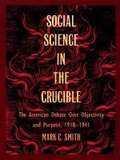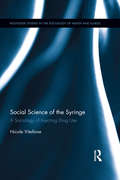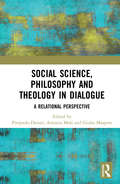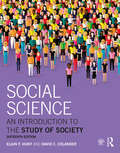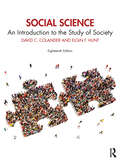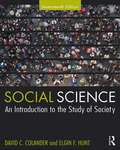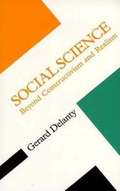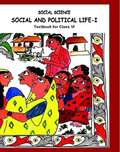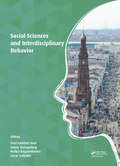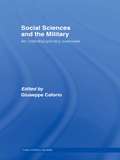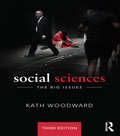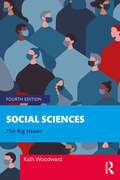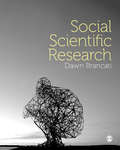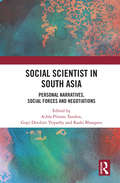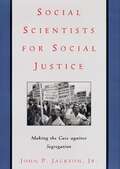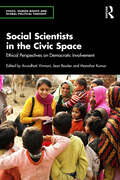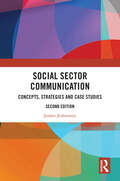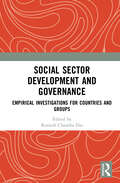- Table View
- List View
Social Science class 8 - Tamil Nadu Board: சமூக அறிவியல் எட்டாம் வகுப்பு
by State Council of Educational Research and Training Tamil Naduதமிழ்நாடு வகுப்பு 8 சமூக அறிவியல் பாடம் புத்தகம் இந்தியா மற்றும் உலகின் வரலாறு, பொருளாதாரம், குடிமக்கள் மற்றும் இயற்கை வளங்களை பற்றிய விரிவான தகவல்களை உள்ளடக்கியுள்ளது. இதில் இந்தியாவில் ஐரோப்பிய நாடுகளின் வரலாற்று தாக்கம், இந்திய விடுதலைப் போராட்டம் மற்றும் அதன் முக்கிய நிகழ்வுகள் விளக்கப்படுகின்றன. புவியியல் பகுதிகள் நிலப்பரப்பின் அமைப்பு, வளங்கள் மற்றும் வேளாண்மையின் முக்கியத்துவத்தை பற்றி விவரிக்கின்றன. அரசியலியல் மற்றும் அரசின் செயல்பாடுகள், இந்திய அரசியலமைப்பின் முக்கியத்துவம், மக்களின் உரிமைகள் மற்றும் கடமைகளும் இந்தப் புத்தகத்தில் உள்ளன. பொருளாதாரம், உலகளாவிய வேக மாற்றங்கள் மற்றும் இந்திய பொருளாதாரத்தில் பணம் மற்றும் கடன் அமைப்புகள் பற்றி மாணவர்களுக்கு விளக்கம் அளிக்கப்படுகிறது
Social Science class 9 - GSTB
by Gujarat State Board of School TextbooksThe Board expresses the pleasure to publish the Textbook of Social Science for Std. 9 which is a translated version of Gujarati language.
Social Science class 9 - MP Board
by Madhya Pradesh Rajya Shiksha Kendra BhopalThis is the Social Science 9th standard book from Madhya pradesh rajya shikha kendra bhopal
Social Science class 9 - Tamil Nadu Board
by State Council of Educational Research and TrainingTextbook for social science for the students of class 9.
Social Science class 9 - Tamil Nadu Board 2024: சமூக அறிவியல் ஒன்பதாம் வகுப்பு
by State Council of Educational Research and Training Tamil Naduஇந்த பாடநூல் சமூக அறிவியலின் நான்கு முக்கிய பிரிவுகளை உள்ளடக்கியது. வரலாறு பகுதியில் மனிதப் பரிணாம வளர்ச்சி, பண்டைய நாகரிகங்கள், தொடக்க கால தமிழ்ச் சமூகம் மற்றும் கலாச்சாரம், செவ்வியல் மற்றும் இடைக்காலம், புரட்சிகள் மற்றும் காலனித்துவம் உள்ளிட்ட நவீன காலத்தின் ஆரம்பம் ஆகியவை இதில் ஆராயப்படுகின்றன. புவியியல் புவியின் உள் மற்றும் வெளி செயல்பாடுகள், வளிமண்டலம், நீர்க்கோளம், உயிர்க்கோளம், மனித-சுற்றுச்சூழல் தொடர்புகள், வரைபடத் திறன்கள் மற்றும் பேரிடர் மேலாண்மை ஆகியவை இதில் அடங்கும். குடியியல் பகுதியில் அரசாங்கத்தின் பல்வேறு வடிவங்கள், ஜனநாயகம், தேர்தல்கள், அரசியல் கட்சிகள், மனித உரிமைகள், உள்ளாட்சி மற்றும் சாலை பாதுகாப்பு ஆகியவை இந்த பிரிவில் விவாதிக்கப்பட்டுள்ளன. பொருளியல் பகுதியில் மேம்பாடு, இந்தியா மற்றும் தமிழ்நாட்டில் வேலைவாய்ப்பு, பணம் மற்றும் கடன், தமிழ்நாட்டில் விவசாயம் மற்றும் இடம்பெயர்வு போன்ற பொருளாதாரக் கருத்துக்களை இந்த பகுதி விளக்குகிறது. இந்த பாடநூலில் கற்றல் நோக்கங்கள், அனிமேஷன்களுக்கான QR குறியீடுகள், விளக்கப்படங்கள், சுருக்கங்கள், கலைச்சொற்கள் மற்றும் ஊடாடும் ஆன்லைன் செயல்பாடுகள் போன்ற பல்வேறு கல்வி அம்சங்களும் உள்ளன.
Social Science in the Crucible: The American Debate over Objectivity and Purpose, 1918–1941
by Mark C. SmithThe 1920s and 30s were key decades for the history of American social science. The success of such quantitative disciplines as economics and psychology during World War I forced social scientists to reexamine their methods and practices and to consider recasting their field as a more objective science separated from its historical foundation in social reform. The debate that ensued, fiercely conducted in books, articles, correspondence, and even presidential addresses, made its way into every aspect of social science thought of the period and is the subject of this book.Mark C. Smith first provides a historical overview of the controversy over the nature and future of the social sciences in early twentieth-century America and, then through a series of intellectual biographies, offers an intensive study of the work and lives of major figures who participated in this debate. Using an extensive range of materials, from published sources to manuscript collections, Smith examines "objectivists"--economist Wesley Mitchell and political scientist Charles Merriam--and the more "purposive thinkers"--historian Charles Beard, sociologist Robert Lynd, and political scientist and neo-Freudian Harold Lasswell. He shows how the debate over objectivity and social purpose was central to their professional and personal lives as well as to an understanding of American social science between the two world wars. These biographies bring to vivid life a contentious moment in American intellectual history and reveal its significance in the shaping of social science in this country.
Social Science of the Syringe: A Sociology of Injecting Drug Use
by Nicole VitelloneThis book addresses the history of harm reduction. It evaluates the consequences and constraints, stakes and costs of the policy of needle exchange for the purposes of harm prevention and health research. Vitellone situates the syringe at the centre of empirical research and theoretical analysis, challenging existing accounts of drug injecting which treat the syringe as a dead device that simply facilitates social action between humans. Instead, this book complicates the relationship between human and object – injecting drug user and syringe – to ask what happens if we see the object as an intra-active part of the sociality that constitutes injecting practices. And what kinds of methods are required to generate a social science of the syringe that is able to measure injecting sociality? Social Science of the Syringe develops material methodologies and epistemologies of injecting drug use to enact the syringe as an object of intellectual inquiry. It draws on the methodologies of social anthropology, Actor-Network-Theory, Deleuze’s empiricism and new feminist materialism to move towards materially-engaged knowledge production. This interdisciplinary approach improves understandings of the causes and effects of injecting behaviour and the problem of needle sharing, as well as providing a more robust empirical framework to evaluate the motivations and consequences of drug use and drug policy. This book will appeal to researchers and students interested in the sociology of health and illness, STS, Actor-Network Theory, empirical sociology, medical anthropology, social and cultural anthropology, addiction theory and harm reduction.
Social Science, Philosophy and Theology in Dialogue: A Relational Perspective
by Pierpaolo Donati Giulio Maspero Antonio MaloThis volume explores the potential of employing a relational paradigm for the purposes of interdisciplinary exchange. Bringing together scholars from the social sciences, philosophy and theology, it seeks to bridge the gap between subject areas by focusing on real phenomena.Although these phenomena are studied by different disciplines, the editors demonstrate that it is also possible to study them from a common relational perspective that connects the different languages, theories and perspectives which characterize each discipline, by going beyond their differences to the core of reality itself. As an experimental collection that highlights the potential that exists for cross-disciplinary work, this volume will appeal to scholars across a range of field concerned with critical realist approaches to research, collaborative work across subjects and the manner in which disciplines can offer one another new insights.
Social Science: An Introduction to the Study of Society
by David C. Colander Elgin F. HuntSocial Science: An Introduction to the Study of Society 16e approaches social science from a common-sense perspective, rather than from a conventional social science angle. Readers will see how seemingly diverse disciplines intermingle – anthropology and economics, for example. The goal of the book is to teach?students critical thought and problem solving skills that will allow them?to approach social issues in an?unbiased manner. ? New to this edition are significant?updates on: ? Race and the police More comparison/contrasts of deviance and criminality Alternative pathways in criminal justice new technology such as self-driving cars Gay marriage American political dynasties Refugee and immigration issues in Europe & globally American political dynasties China’s growing power New trade initiatives "States" in the Middle East Nuclear arms control? Expanded web-based ancillaries for students and teachers
Social Science: An Introduction to the Study of Society
by David C. Colander Elgin F. HuntNow in its eigthteenth edition, Social Science: An Introduction to the Study of Society approaches its study from a common sense perspective, rather than a formalistic perspective more common in social science texts. Readers will see how seemingly diverse disciplines intermingle and connect to one another—anthropology and economics, for example. The goal of the book is to teach students critical thinking and problem-solving skills that will allow them to approach social issues in an objective and informed way. New to this edition are significant updates on: Debates about the limits of democracy, and the developing Chinese political alternative. Political, economic, and social implications of the Covid pandemic. Assessment of the Donald Trump presidency. Political, economic, and social implications of the movement from the Trump presidency to the Biden presidency. Implications of the multitrillion-dollar budget deficits the US government has been running. The emergence of populist movements throughout the world. The Chinese political and economic challenge to the United States. Recent developments in evolution theory. Examples, data, recommended readings, and Internet questions. Critical thinking questions.
Social Science: An Introduction to the Study of Society (Alternative Etext Formats Ser.)
by David C. Colander Elgin F. HuntNow in its seventeenth edition, Social Science: An Introduction to the Study of Society approaches its study from a common-sense perspective, rather than a formalistic perspective more common in social science. Readers will see how seemingly diverse disciplines intermingle and connect to one another – anthropology and economics, for example. The goal of the book is to teach students critical thinking and problem-solving skills that will allow them to approach social issues in an objective and informed way. New to this edition are significant updates on: The election of Donald Trump and the emergence of related populist movements Trade policy and health care Issues involving migration and immigration Emerging developments in artificial intelligence Comparisons between cultural and biological evolution Examples, data, recommended readings, and internet questions
Social Science: Beyond Constructivism and Realism
by Gerard DelantyThis concise and comprehensive volume provides an accessible overview of the main debates on the sociology and philosophy of the social sciences. Exploring the changing conceptions of social science from the 16th century to today, sociologist Gerard Delanty argues how this group of disciplines is recovering its role as the critical voice of modernity.
Social Science: India and the Contemporary World - I & Democratic Politics class 9 - Goa Board
by National Council of Educational Research and Training"India and the Contemporary World - I" and "Democratic Politics" are two essential NCERT books for Class 9 students, offering comprehensive insights into India's historical evolution and the principles of democratic governance. "India and the Contemporary World - I" delves into India's past, exploring themes such as the French Revolution, socialism, colonialism, nationalism, and the significant events that shaped the modern world. It provides a vivid portrayal of India's struggle for independence and its socio-political changes during the 18th and 19th centuries, highlighting pivotal moments and influential personalities. On the other hand, "Democratic Politics" focuses on the fundamental aspects of democracy, governance, and political institutions. It explains the functioning of democracy, electoral processes, institutions like Parliament, the judiciary, and the roles they play in sustaining a democratic society. Additionally, the book emphasizes civic responsibilities, rights, and duties of citizens in a democratic setup, aiming to cultivate an understanding of the democratic system prevalent in India. Together, these books offer a holistic view of India's historical context and the foundational principles of its democratic framework, enabling students to comprehend the nation's past and present socio-political landscape.
Social Science: Social and Political Life-I class 6 - NCERT - 23
by National Council of Educational Research and Training"Social and Political Life - I" is a comprehensive textbook designed for Class VI students, aiming to introduce them to the diverse aspects of society, politics, and governance. Through engaging narratives and activities, the textbook navigates learners through the fundamentals of social science, emphasizing the importance of understanding the world around them. It covers various topics such as diversity and discrimination, understanding government, local government, and democratic politics. The book focuses on cultivating critical thinking skills, encouraging students to analyze societal structures, political systems, and the significance of active citizenship. By delving into concepts like rights and responsibilities, power-sharing, and the role of individuals in a community, this textbook aims to instill a sense of civic consciousness and participation among young learners. It uses relatable examples and scenarios to enable students to grasp complex concepts, fostering a deeper understanding of how society functions and how individuals can contribute to positive social change.
Social Sciences and Interdisciplinary Behavior: The 4th International Congress on Interdisciplinary Behavior and Social Science (ICIBSoS 2015), Kazan Federal University, Kazan, Russia, 22-23 October 2015 & Arya Duta hotel, Jakarta, Indonesia, 07–08 November 2015
by Ford Lumban Gaol, Fonny Hutagalung, Nailya Bagautdinova & Lenar SafiullinSocial Sciences and Interdisciplinary Behavior contains papers that were originally presented at the 4th International Congress on Interdisciplinary Behavior and Social Science 2015 (ICIBSoS 2015), held 22-23 October 2015 at The Institute of Management, Economics and Finance of the Kazan Federal University, Kazan, Russia and 7-8 November 2015 in Arya Duta Hotel, Jakarta, Indonesia. The contributions deal with various interdisciplinary research topics, particularly in the fields of social sciences, education, economics and arts. The papers focus especially on such topics as language, cultural studies, economics, behavior studies, political sciences, media and communication, psychology and human development.
Social Sciences and the Military: An Interdisciplinary Overview (Cass Military Studies)
by Giuseppe CaforioThis innovative book presents the reader with a clear international view of interdisciplinary and intradisciplinary approaches to military and conflict-resolution studies. In this first title on its subject, leading expert Giuseppe Caforio offers a thorough analysis of the new aspects and trends of the social sciences in studying the military. Since the end of the Cold War, military operations other than war, crisis-response operations, the fight against terrorism, and hi-tech warfare have posed for the militaries of all countries a new set of human and social challenges and problems of an intensity that had never been seen in peacetime. Sociology, social psychology, anthropology and the science of conflict are grappling with these issues, common to all armed forces, with a new fervour. This new book offers an update on the state-of-the-art on this theme and defines the latest study and research trends in the field. Social Sciences and the Military contains essays by some of the most highly regarded scholars on the subject and will be essential reading for all students of civil-military relations, conflict resolution and military studies in general.
Social Sciences: The Big Issues
by Kath WoodwardThe social sciences are about people and the relationships between individuals and the social and material world we live in. They are about the social structures which shape – and are shaped by – social forces such as ethnicity, race, gender, sexuality and age and the bodies we inhabit. How are these relationships changing and to what extent and how can people influence change? What are the big issues which concern us today? How can the social sciences help us to understand what is going on? Social Sciences: The Big Issues third edition looks at what matters in terms of what is changing and what remains the same in contemporary life, bringing together personal concerns and social forces. Fully revised and updated, this book explores some of the debates about how we live our personal, domestic and emotional lives at a time of change and disruption, including economic crises and uncertainties. The issues covered include: changing selves and personal lives; the role of consumption and consumerism; materialism and material culture; as well as citizenship, migration and globalization as both opportunities and sources of inequality in the contemporary world and in everyday lives. The third edition of Social Sciences: The Big Issues provides a clear, accessible introduction to the ideas and approaches of the social sciences across a range of disciplines, including sociology, psychology and politics.
Social Sciences: The Big Issues
by Kath WoodwardFully revised and updated, the fourth edition of Social Sciences: The Big Issues explores key debates about how we live our personal, domestic and emotional lives at a time of enormous, previously unimaginable change and disruption, including a pandemic that locked down households and economies. Since the third edition, everyone’s life has changed. The pandemic – at least temporarily – stopped social life as we knew it and virtually forced governments to close down their economies. This is where this edition of The Big Issues starts. Staying at home posed a radical departure from routine life, but reactions to Covid-19 have exposed the endurance of particular social relations – especially inequalities – which characterize societies worldwide. A few of the new big issues covered in this edition include: Changing selves and personal lives in light of racism and sexual and identity politics in a pandemic Changing patterns of consumption in relation to market production and what it means for climate change Changing intersections of citizenship, migration and globalization in the context of the virus crossing borders, and both the opportunities and sources of inequality involved Changing ideas about power, politics and populism in the aftermath of Brexit Building on the strong foundation of this well-loved text, this fully revised fourth edition explores how big issues and social forces intersect to create both change and evidence of continuity, especially of social inequalities. It provides a clear, accessible introduction to the ideas and approaches of the social sciences across a range of disciplines, including sociology, psychology and politics.
Social Scientific Research
by Dawn BrancatiOffering an engaging and entertaining introduction to research methods, this is a practical and easy-to-use companion for all new researchers and students in the social sciences. Covering all the key stages of the research process, this book guides students in navigating some of the biggest challenges in developing a research project. This book: Uses real-life everyday examples, connecting research methods to your experiences Includes dedicated chapters on identifying a research question, ethics and writing up your findings Comprises an array of activities, tips, illustrations and international case studies Covers qualitative, quantitative and mixed methods research Bringing methods to life for students across the social sciences, this book will provide you with the confidence you need to get your research off the ground.
Social Scientific Research
by Dawn BrancatiOffering an engaging and entertaining introduction to research methods, this is a practical and easy-to-use companion for all new researchers and students in the social sciences. Covering all the key stages of the research process, this book guides students in navigating some of the biggest challenges in developing a research project. This book: Uses real-life everyday examples, connecting research methods to your experiences Includes dedicated chapters on identifying a research question, ethics and writing up your findings Comprises an array of activities, tips, illustrations and international case studies Covers qualitative, quantitative and mixed methods research Bringing methods to life for students across the social sciences, this book will provide you with the confidence you need to get your research off the ground.
Social Scientist in South Asia: Personal Narratives, Social Forces and Negotiations
by Achla Pritam Tandon Gopi Devdutt Tripathy Rashi BhargavaThis book is a collection of autobiographical narratives by leading social scientists working across South Asia. It explores the linkages between their personal experiences and academic pursuits and analyzes how personal, political, and professional choices shape knowledge production and effect social transformation. The narratives revisit long-standing debates on objectivity, subjectivity, self, and other and attempt to collapse the binaries that have informed the social sciences until now. Highlighting the state of research and pedagogy in the social sciences in the region, the book questions the conventional understanding of the task of the social scientist and, in doing so, blurs the distinction between theory, research, pedagogy, and activism. A unique and compelling contribution, this volume will be indispensable to students and researchers of sociology, anthropology, history, creative writing, education, politics, biography studies, and South Asian studies. It will also be of interest to general readers.
Social Scientists for Social Justice: Making the Case against Segregation (Critical America #85)
by John P. Jackson Jr.In one of the twentieth century's landmark Supreme Court cases, Brown v. Board of Education, social scientists such as Kenneth Clark helped to convince the Supreme Court Justices of the debilitating psychological effects of racism and segregation. John P. Jackson, Jr., examines the well-known studies used in support of Brown, such as Clark’s famous “doll tests,” as well as decades of research on race which lead up to the case. Jackson reveals the struggles of social scientists in their effort to impact American law and policy on race and poverty and demonstrates that without these scientists, who brought their talents to bear on the most pressing issues of the day, we wouldn’t enjoy the legal protections against discrimination we may now take for granted. For anyone interested in the history and legacy of Brown v. Board of Education, this is an essential book.
Social Scientists in the Civic Space: Ethical Perspectives on Democratic Involvement (Ethics, Human Rights and Global Political Thought)
by Arundhati Virmani, Jean Boutier, and Manohar KumarThe book explores the stakes for the social sciences around four central problems: the challenges of context; modes of intervention; involvement; and the ethical dilemmas for the scholar in a democratic space. The first, challenges of the context, examines the variety of situations confronted by scholars since the beginning of the 20th century. These include their interventions in key judicial affairs, the impact of technological developments like the introduction of big data, or even the positionality of the scholar. Second, the book investigates the modalities according to which social scientists may intervene in the civic space: in particular as specialists, as experts, or in the media. A third problem brings together some cases illustrative of researchers’ involvement in critical issues, such as food policies, major social reforms, or gender-related questions. Finally, the book concludes with a reflection on the modes of exercising critique or dissent in democratic societies and on the ethical dimensions of involvement in the civic space.A searing examination of the role of social scientists, as they are called upon to address the multiple critical issues faced by contemporary societies, from pandemics to climatic change, sustainable development, migration, ethnicity, or the place of religion. This volume will be of great interest not just to scholars, students, and researchers of the social sciences but to the general reader as a concerned citizen.
Social Sector Communication: Concepts, Strategies and Case Studies
by Jaishri JethwaneyCommunication, advocacy, and outreach are germane to the success of any organisation working in the social sector. This book provides a robust conceptual framework that is required to understand the demands of the sector and suggests strategies and tools for those engaged in social sector communication.This book not only highlights the theoretical underpinnings, practice, and skill of social sector communications in India but also provides an understanding of various skills and approaches required in communication including social marketing, media advocacy, social mobilisation, grassroots communication, and corporate social responsibility (CSR). With the aid of case studies, it offers suggestions on how to plan campaigns; write a concept note, field report, and press release, and effectively use social media to achieve developmental programme goals. This revised edition discusses the different perspectives of NGOs and programme implementers and helps in understanding the corporate–NGO interface vis-à-vis CSR projects.This book will be useful to students of social work, business, and management preparing for roles in social enterprises. It will also be of use to working professionals in the social sector.
Social Sector Development and Governance: Empirical Investigations for Countries and Groups
by Ramesh Chandra DasThis volume explores the impact of good governance upon social sectors&’ development in India and other selected economies of the world. Economic development in the true sense depends on the development of different social sectors like education, healthcare, gender equality, etc., as well as economic factors. Good governance makes the sectors perform well on the one hand, and helps in economic growth and development on the other. Conversely, bad or weak governance in the form of corruption and low effectiveness of the governments, may lead to poor performance of the sectors, and low growth and backwardness of the economies. This book explores the associations between different social sectors&’ performances with quality of governance, and growth and development of different economies and groups in detail and establishes theoretical and empirical examinations for the individual economies and groups from the different corners of the globe with the help of new theories and latest data. This book will be useful for students and researchers in the fields of Economics, Sociology, Political Studies, Public Finance, International Relations, Social Sciences as well as policy makers and think tanks.

